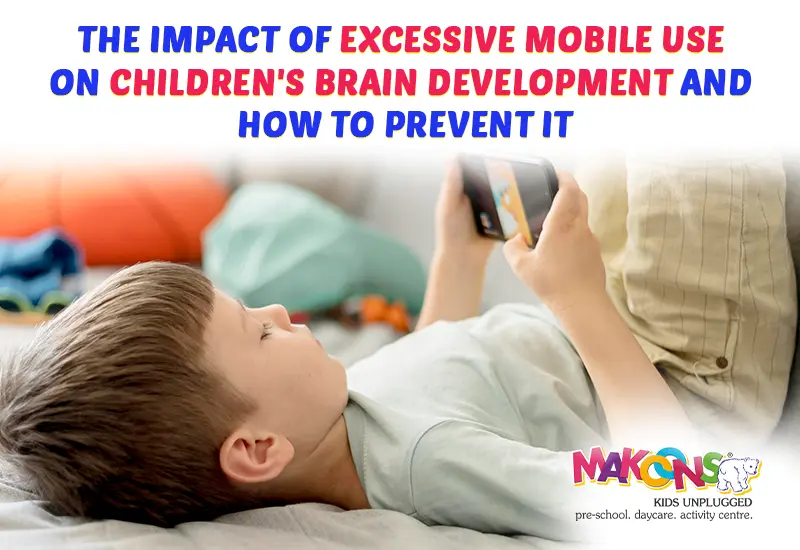In today’s world, it feels like mobile phones are everywhere, even in the small hands of our kids. Although these phones provide us with many advantages, the impact of mobile phones on children is causing serious concerns among parents, teachers, and medical professionals as well. Excessive screen time can have strong impacts on young minds’ cognitive and emotional growth while they are still in the process of maturing. Let’s talk about how mobile phones harm kids and what we can do to preserve the next generation.
Understanding the Problem
Kids nowadays are being raised with technology around them. The typical age when children get their first smartphone keeps falling, and many of them get mobile devices before they enter elementary school. Such early and extensive exposure is raising critical questions regarding how mobile phones impact children’s brains during early developmental stages.
Too much screen time can affect many areas of brain development, such as attention span, intelligence, and emotion regulation. The brain of the developing child is extremely plastic, i.e., more susceptible to environmental influences compared to adult brains. While children spend hours upon hours scrolling social media or engaging in mobile game activities, they lose valuable real-world experiences, which contribute to well-formed, healthy connections in the neural system.
Effects of Mobile Phones on Brain-
Let’s discuss the negative effects of mobile phones on kids and how we can save the next generation.
- Sleep Disruption: Mobiles emit blue light, due to which it becomes harder for children to fall asleep. Poor sleep quality follows, which impairs brain growth and learning ability.
- Attention Problems: Constant stimulation and fast material changes on mobile gadgets could teach young minds to demand quick pleasure and fight with continuous concentration.
- Delayed Language Development: Screen time often replaces vital face-to-face interactions that develop language abilities, hence robbing time spent on screens. Human connection teaches children to communicate and grasp language; passive screen use does not.
- Emotional Regulation Challenges: Some kids find it harder to control their emotions when screens become their main coping tool for boredom or discomfort.
The Rise of Mobile Phone Addiction in Children
Mobile phone addiction is currently one of the most distressing problems for parents as more and more youngsters suffer from it. The child’s behavior provides many signs of mobile phone addiction:
- Preoccupation with device use
- Withdrawal symptoms occur when unable to use their phone
- Using devices to escape negative emotions
- Continuing excessive use despite adverse consequences
- Conflict with parents over usage restrictions
Children are vulnerable to creating these addictive habits that can be reduced if only parents pay attention to their kids. Many of the most well-liked games and apps are designed to cause dopamine release, creating reward loops that drive users to return often.
Practical Strategies to Prevent Mobile Addiction in Children
The way to prevent mobile addiction in kids while yet allowing appropriate usage of technology is:
- Set Clear Boundaries- Establish Strong Rules on When and Where Mobile Phones May Be Used. Device-free zones may include the Bedroom(particularly at night), the dinner table, or family activities.
- Practice Healthy Behavior- Children observe what their parents do. Watch out for your own screen time and practice healthy technology use. Ex- do not check your phone repeatedly.
- Encourage Alternative Activities- Alternate activities such as Sports, art, music, reading, and outdoor exploration will keep your child away from the digital world for some time.
- Prioritize Quality Sleep- Implement a “digital sunset” habit where all devices are powered off at least an hour prior to bedtime. This helps in limiting the effect of blue light exposure on quality sleep.
- Encourage open communication: Discuss technology on a regular basis with your children—its advantages and disadvantages. Explain to them why limits are important and engage them in the development of family media plans as they get older.
- Use Parental Controls smartly: Control technology use via technology itself. Parental control applications can provide insights into your child’s digital activity, limit screen time, and block objectionable material.
Conclusion
The goal is not to condemn technology or remove cell phones from kids’ lives completely. Rather, we should strive for a fair middle ground that teaches kids to utilize technology as a tool and not a crutch, so as to remove the negative consequences of mobile phones on children as much as feasible.
Parents may guarantee that the next generation grows up with healthy relationships with technology by understanding how mobile phones affect children’s brains and taking deliberate actions to prevent mobile addiction among children. The virtual world is here to stay, but with careful direction, we can make sure our kids grow up utilizing it without sacrificing their cognitive, emotional, and social development.
Also Read -List of Top Nutritious Food for Your Baby While Traveling
Every child has a unique temperament and needs, hence parents should remember to employ various approaches for various children. Now is the moment to properly form them for the use of technology


